How to Have to Blue Arrows on Short Cuts
Blue Arrows on Windows 10 Icons – What Does It Mean?
Windows 10 changes may come out of nowhere every once in a while — especially changes to the interface, such as icons and the Start menu. In this article, you can learn what the blue arrows on Windows 10 icons mean, and how to remove them.
If you're not very experienced with the system, seeing 2 blue arrows pointing inwards in the top right corner of a Windows 10 file may be alarming. However, you don't have to worry about it at all. This is a simple indicator to tell you that the file has been compressed, meaning that the file size is smaller and easier to transfer.
To some users, this indicator is rather annoying. If you want to learn how to remove it, continue reading our article.
What is the blue arrows icon on files and folders in Windows 10?
Some files and folders may be large in size - this takes a toll on your storage, causing you to run out of available disk space sooner. In an attempt to fix this issue, Windows 10 and various other applications may attempt to compress files and folders to save disk space. The blue arrows icon is supposed to indicate NTFS compression .
![]()
This is a feature introduced in a Windows 10 update. Having low free space on your hard disks can cause your device to slow down, and may even prevent you from saving files. Having more space allows your system to create more cache, and the applications installed will also run faster.
The compression itself has little to no effect on your files, other than the reduced file size.
How to remove the blue arrows icon from files and folders in Windows 10
Despite its good effects, many users are complaining that the blue arrows icon is distracting and doesn't look nice with the rest of the system. There are two ways to remove the blue arrows icon from the corner of your files.
Method 1. Turn off file compression in Windows 10
The easiest way to get rid of the blue arrows icon is by turning off file compression entirely. This may not be recommended depending on how much free space there is on your computer. If you don't worry about causing damage to your system by uncompressing your files, follow the steps below.
- Open the File Explorer . This can be done by clicking on the Explorer icon in your taskbar, or by pressing the Windows + E keys on your keyboard.
- Navigate to any file or folder that has the blue arrows icon. Right-click on it, and then choose Properties .
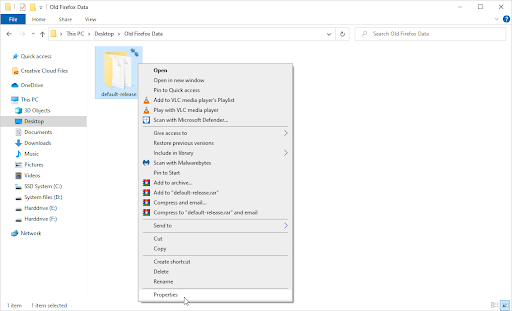
- A new pop-up window should appear. Here, stay on the General tab, and click on the Advanced… button in the Attributes section.
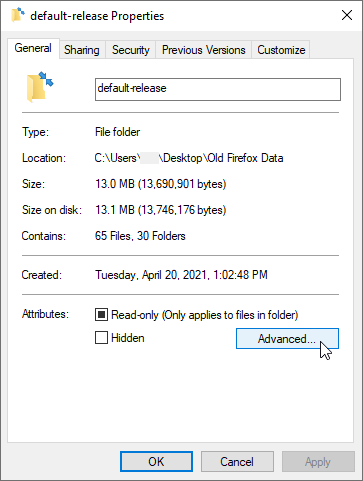
- Remove the checkmark from the Compress contents to save disk space option, found in the Compress or Encrypt attributes section.
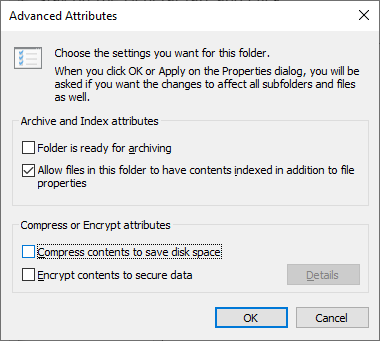
- Press OK , and then click on the Apply button. In the pop-up window, select Apply changes to this folder, subfolders, and files .
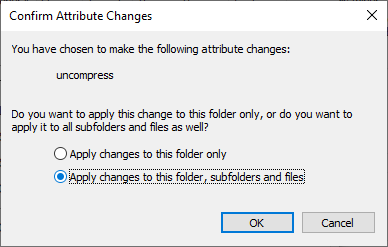
- Press OK and repeat the steps for any other files that have the blue arrows icon. By performing this method, you'll be able to remove it from any file or folder.
Method 2. Replace the blue arrows with a blank icon
If you wish to keep your files compressed to save disk space, you can simply replace the blue arrows icon with a blank icon. This can be done via the Registry Editor. Performing this method will keep the files and folders compressed, but the blue arrows will disappear from the corner of the icon.
- Press the Windows + R keys on your keyboard. This is going to bring up the Run utility.
- Type in " regedit " without the quotation marks and press the Enter key on your keyboard. This will launch the Registry Editor application.
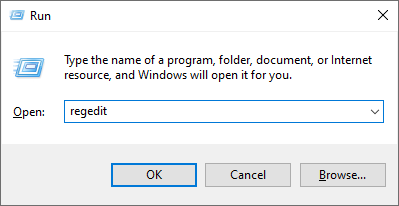
- When prompted by the User Account Control (UAC), click Yes to allow the app to launch with administrative permissions.
Need help? Check out our How to make a local user an administrator in Windows 10 guide. - Navigate to the following key: HKEY_LOCAL_MACHINE\SOFTWARE\Microsoft\Windows\CurrentVersion\Explorer
- You can use the address bar in the Registry Editor to type or paste the key as well, making navigation faster.

- Select the Shell Icons key from the left-side pane.
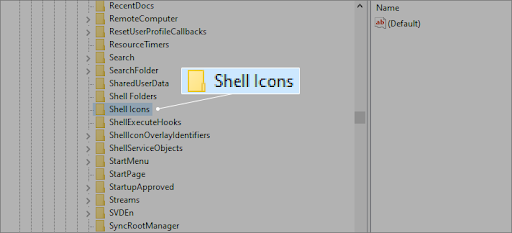
- If you don't have it, right-click on the Explorer key in the left-side pane, and select New → Key . Make sure to name it " Shell Icons " without the quotation marks.
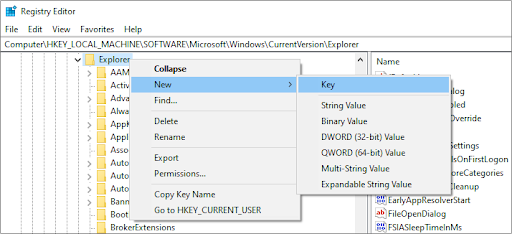
- Right-click on any empty space in the right-side pane, and then choose New → String Value . Name it " 179 " without the quotation marks.
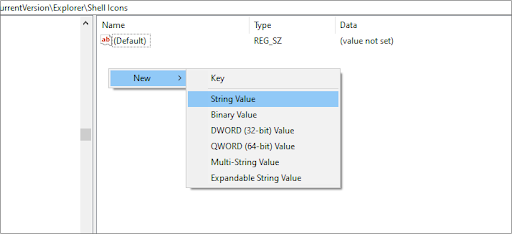
- Double-click on the newly created 179 string value. Set the value data to the C:\Windows\blank.ico path. If your system is installed on a different drive, make sure to change the drive letter accordingly.
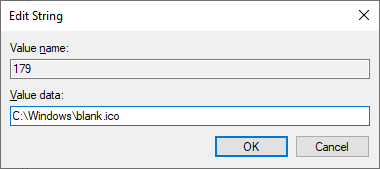
- Click OK and reboot your computer. You should immediately see the blue arrows icon disappear from your files, even if they're still compressed.
Final thoughts
Our Help Center offers hundreds of guides to assist you if you're in need of further help. Return to us for more informative articles, or get in touch with our experts for immediate assistance.
One more thing
Would you like to receive promotions, deals, and discounts to get our products for the best price? Don't forget to subscribe to our newsletter by entering your email address below! Be the first to receive the latest news in your inbox.
You may also like
» How To Show Only Tiles On Windows 10's Start Menu
» How to Enable Dark Mode in the Windows 10 File Explorer
» How To Find Your Windows 10 Product Key
harvardwastoponcen99.blogspot.com
Source: https://softwarekeep.com/blog/blue-arrows-on-windows-10-icons-what-does-it-mean
Belum ada Komentar untuk "How to Have to Blue Arrows on Short Cuts"
Posting Komentar